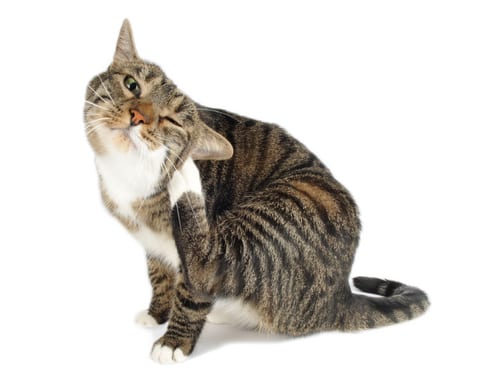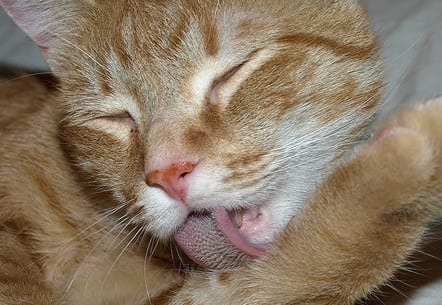As we saw in previous notes, eczema feline, also known as military dermatitisIt is one of the most common skin diseases in felines, and is characterized by the reaction that the skin presents to allergies, infections and even inflammations. In addition to being one of the most common dermis diseases, it is also one of the main causes of hair loss in this little animal.
It is for this reason that today we bring you some Tips for treating and preventing eczema in your kitty:
- As we always repeat, the food we give our animal is vital for this and other types of cases. It is important that we feed our cat with high quality products that are fresh and that do not contain any type of artificial coloring, preservative or other toxic element that can deteriorate or damage its immune system.
- If your cat suffers from eczema and the vet has already diagnosed it and is under anti-inflammatory remedies, it is important that we prevent it from continuing to scratch or scratch the skin or the affected area. For this, I recommend that you use the special covers to cover the nails of your animal, in this way it will avoid scratching, hurting itself, and continuing to contaminate the rest of its skin with this disease.
- Because flea bites are the most common cause of feline eczema, it is important that you always keep an eye on your cat's skin condition. In the same way, you should make sure to prevent the infestation of this parasite and thus avoid this and other allergic diseases that can be produced by the bite of fleas.
- It is recommended that you treat your animal's skin with natural and holistic creams and remedies, rather than common medicine remedies. There are medicinal plants that can give your animal relief and prevent it from suffering discomfort from this disease. Keep in mind that feline eczema, although not fatal, if not treated in time can lead to other more serious complications.


My cat is like three-quarters wild and another crazy, as we live in the forest it is usual for him to disappear for several days and come in a week to ask for pampering.
He has developed an eczema on his ear, which since he does not stop scratching, has spread.
We have tried those mittens so that it cannot be scratched, but it takes them off. To apply chamomile infusion with a few drops of oil (a remedy for humans) but run away (either by hand or with a diffuser).
It scratches with the branches, it causes vomiting if given unnatural medication and it is impossible to keep it at home for regular treatment. We tied him with an extendable strap to a cable (not light, obviously), having about a hundred meters to run around and that he was locatable and he scratched himself so much to get out of running that we had to find him by following a trail of blood.
Is there a strong enough remedy that does not require continuity and is natural? I know I'm asking for a miracle, but seriously, it's sad to see it.
My cat has wet eczema on his paws, we have already medicated him according to his medical prescription and he is improving at the moment but it is not cured ... is there a cure for this disease?
Hi Rossana.
Eczema does heal, but it can take time.
With patience and daily care you will recover 🙂
A greeting.